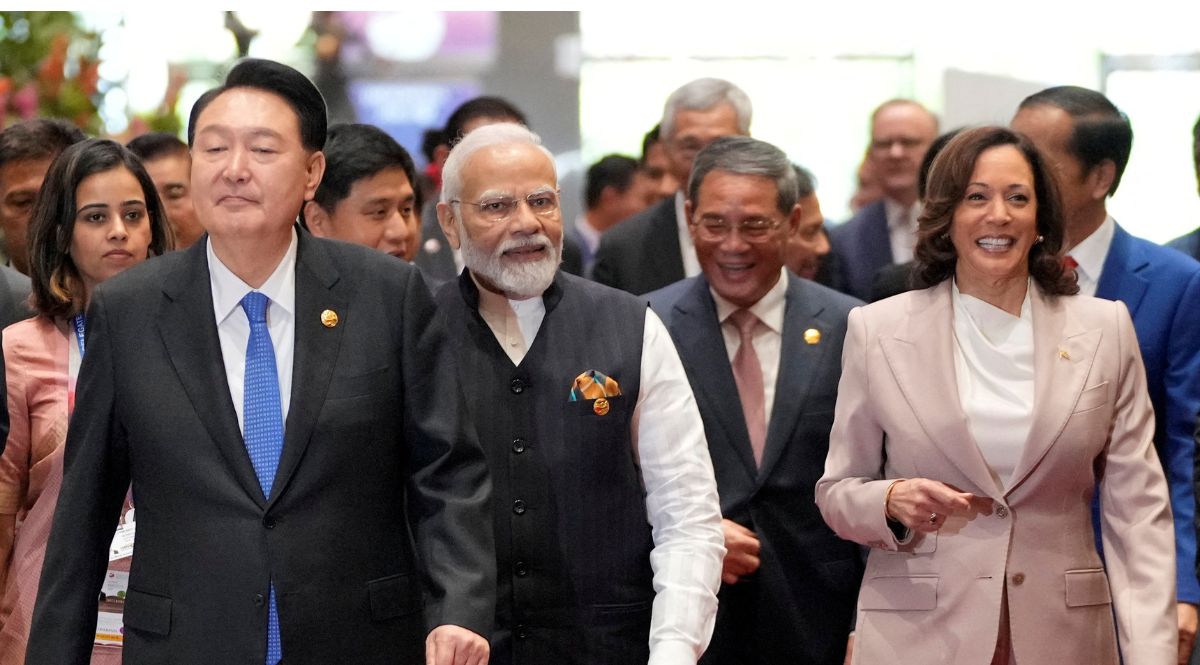U.S. Presidential Election: If Harris Wins, Multilateral Cooperation to Play Key Role in Foreign Policy
If Kamala Harris wins the presidential election, the U.S. will treat China as the main threat but will remain significantly engaged in Europe, maintaining political and military leadership in NATO. The most serious adjustment is possible in the approach towards Israel and its war with Hamas, in which the U.S. could take a more humanitarian position that takes into account the interests of the Palestinians. At the same time, Harris’s position in the international arena will most likely be weaker than Biden’s, which could encourage China, Russia, North Korea, and Iran to test the credibility of U.S. international obligations.
 POOL / Reuters / Forum
POOL / Reuters / Forum
Foreign policy is a significant element of this year’s election campaign, primarily because of American interests in Russia’s war against Ukraine and Israel’s war against Hamas. Although these issues are not as important as the economy, immigration and border protection, or education, they are indicated by voters as important. In a Gallup survey of September 2024, respondents indicated at least “great importance” of the candidates’ positions on: terrorism and national security (83%), foreign policy (70%), the situation in the Middle East (64%), trade with other countries (62%), relations with Russia (60%), and relations with China (59%).
China and the Indo-Pacific
If elected, Harris is likely to continue Biden’s policy towards China. Her administration would seek to maintain a multi-level dialogue to reduce the risk of unintentional military incidents that could escalate, while creating opportunities for cooperation in solving global problems, such as the fight against climate change. At the same time, the priority will continue to be limiting China’s influence, primarily economic, in Asia, North America, and Europe, and criticising its human rights violations of, among others, the Uyghurs, and violation of international law, especially freedom of navigation, as well as supporting Taiwan’s defence through arms sales. Harris also would continue a protectionist approach to the economy, which is intended to facilitate economic competition with China. Her administration will maintain the tariffs introduced so far, and may also decide to impose new ones, counteracting the effects on its own economy of China’s subsidies in selected sectors. This will make it possible to limit the access of Chinese entities to the U.S. market and reduce dependence on products from China, which should also facilitate the strengthening of production capacity in the U.S.
The basis for the approach to the Indo-Pacific will continue to be bilateral alliances with Australia, the Philippines, Japan, South Korea, and Thailand. Harris will also strive to strengthen contacts with countries with which she was involved as vice president—the allied Philippines and partners in the region, including Vietnam and Singapore. Among the key multilateral formats, AUKUS will remain an important tool of regional security policy. It will also be strengthened by continued U.S. participation in QUAD and efforts to maintain the trilateral partnership with Japan and South Korea. The Harris administration may also urge NATO and EU countries to increase political, military, and economic cooperation with American allies in the Indo-Pacific. In economic matters, Harris will strive to deepen cooperation with ASEAN members and within the Indo-Pacific Economic Initiative (IPEF), which may constitute a counterweight to China’s economic expansion in the region.
Europe and Transatlantic Cooperation
Harris is expected to continue Biden’s policy towards Russia, which the U.S. considers a revisionist state and a military threat to it and its allies. The main assumption will be to continue to treat NATO as the key alliance for American and European security. This will involve maintaining high military involvement in Europe (although small reductions cannot be excluded) and not questioning allied commitments, while maintaining pressure on increasing the defence spending of individual countries. At the same time, the Harris administration may be willing to enter into negotiations to end the war in Ukraine. This is due to the low probability that Congress will adopt another financing package for Ukraine, which would enable the continuation of the war at the current level. The U.S. goal would therefore be to stop the hostilities and prevent Russia from escalating again, and perhaps even provide Ukraine with some kind of security guarantee. However, it is unlikely that the U.S. will change its position on Ukraine’s membership in NATO. By consulting with allies in Europe, the U.S. is likely to try to persuade them to take primary responsibility for continuing the support for Ukraine. Harris will also maintain political and economic cooperation with the EU, both in direct EU-US relations and in the G7 format. However, transatlantic relations will continue to be affected by tensions resulting from subsidies and protectionism by both sides, as well as from different interests in the approach to the digital sector.
Israel and the Middle Eastern Arab States
The one foreign policy area with the probability of the most serious correction concerns the U.S. attitude towards Israel’s war with Hamas. It results both from Harris’s more conditional support for Israel’s actions and from the expectations of part of the Democratic Party electorate regarding, among others, the protection of Palestinian civilians. A Harris administration could place greater emphasis on providing emergency humanitarian assistance to the Palestinians and seeking a long-term solution for Palestine in dialogue with the Israeli authorities and as part of the broader diplomatic process with Arab states. The change would be to develop and clearly communicate the goal that should be achieved to ensure stability in the Middle East. At the same time, Harris’s ability to put pressure on Prime Minister Benjamin Netanyahu will continue to be limited. It is unlikely that arms supplies to Israel will be suspended, as it could undermine U.S. credibility and encourage Iran to test the new administration’s readiness to engage in a regional conflict. Like the current administration, Harris will strive to stabilise regional security and limit the freedom of action of Iran and the groups it supports (Hamas, Hezbollah, the Houthis) through cooperation with a large group of countries in the region and diplomatic engagement. For this purpose, cooperation with Saudi Arabia and the United Arab Emirates will be maintained, despite criticism of their human rights violations.
Global South
Harris will strive to counteract the influence of China and Russia in the world by strengthening cooperation with the countries of the Global South. This could be achieved, for example, by another U.S.-Africa summit and deepening relations with the African Union. Relations with Latin America will also be important, also due to the large scale of irregular migration to the U.S. from the region. To reduce it, the Harris administration could increase development aid to Honduras, El Salvador, and Guatemala, states from which about 25% of all immigrants to the U.S. southern border come. This would also require more effective cooperation with Mexico in securing the common border, counteracting the activity of criminal groups, and pursuing a more effective asylum policy.
Conclusions
A Harris presidency would represent a continuation of the current administration’s approach and actions in many areas of foreign policy. It will be defined by a strong belief in multilateralism and attempts to achieve goals through participation in multilateral formats. Harris, as a less experienced politician than President Joe Biden, could initially be perceived as weaker in the international arena. This could encourage China and Russia, as well as North Korea and Iran, to increase their threats and test—using hybrid and military means—the credibility of the U.S. in its international obligations.
The administration may increase its criticism of Israel for its conduct of the war in the Gaza Strip, perhaps also in Lebanon, but with limited ability to influence Israeli policy, this will mainly serve the needs of the domestic socio-political scene. It is also possible that, as during Biden’s term, the emphasis on rapprochement with African and Latin American countries will not bring results due to the priority of the challenges in the Indo-Pacific, Europe, and the Middle East. The Harris administration can, however, increase the U.S ability to influence security in the Indo-Pacific by using economic initiatives that are beneficial to the countries of the region, such as IPEF.
The U.S. under Harris will continue to support European security mainly through its military involvement within NATO, constituting the main pillar of the Allied defence and deterrence potential. Although a large reduction in U.S. military forces in Europe is not expected, it is possible some of the forces deployed after Russia’s full-scale invasion of Ukraine in 2022 will be withdrawn. At the same time, Harris will not quickly solve the problem of the U.S. lack of capacity to fight two wars simultaneously (in Europe and Indo-Pacific). Therefore, her administration will strive—more strongly than Biden’s, but in a much different form than Trump’s in 2017-2021—to strengthen the participation of European countries in ensuring the security of the transatlantic area (within the concept of the European pillar of NATO). Like Biden, she will try to limit the risk of Russian escalation, which will translate into excluding the option of significantly strengthening U.S. deterrence in Europe, for example, by deploying new military capabilities in the countries of the Eastern Flank. It also is unlikely that it could increase or even maintain the current military support for Ukraine. Strengthening the assistance provided by European countries will therefore be necessary to ensure Ukraine’s defence capabilities and to create the appropriate conditions for negotiations with Russia.




.png)
.png)
(1).png)